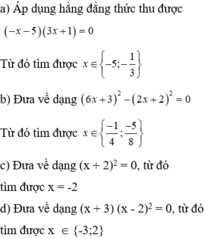Giải các phương trình: 4 . 9 x + 12 x - 3 . 16 x = 0
Tuyển Cộng tác viên Hoc24 nhiệm kì 26 tại đây: https://forms.gle/dK3zGK3LHFrgvTkJ6

Những câu hỏi liên quan
1) Giải các phương trình sau : a) x-3/x=2-x-3/x+3 b) 3x^2-2x-16=0 2) Giải bất phương trình sau: 4x-3/4>3x-5/3-2x-7/12
\(a,\dfrac{x-3}{x}=\dfrac{x-3}{x+3}\)\(\left(đk:x\ne0,-3\right)\)
\(\Leftrightarrow\dfrac{x-3}{x}-\dfrac{x-3}{x+3}=0\)
\(\Leftrightarrow\dfrac{\left(x-3\right)\left(x+3\right)-x\left(x-3\right)}{x\left(x+3\right)}=0\)
\(\Leftrightarrow x^2-9-x^2+3x=0\)
\(\Leftrightarrow3x-9=0\)
\(\Leftrightarrow3x=9\)
\(\Leftrightarrow x=3\left(n\right)\)
Vậy \(S=\left\{3\right\}\)
Đúng 1
Bình luận (0)
\(b,\dfrac{4x-3}{4}>\dfrac{3x-5}{3}-\dfrac{2x-7}{12}\)
\(\Leftrightarrow\dfrac{4x-3}{4}-\dfrac{3x-5}{3}+\dfrac{2x-7}{12}>0\)
\(\Leftrightarrow\dfrac{3\left(4x-3\right)-4\left(3x-5\right)+2x-7}{12}>0\)
\(\Leftrightarrow12x-9-12x+20+2x-7>0\)
\(\Leftrightarrow2x+4>0\)
\(\Leftrightarrow2x>-4\)
\(\Leftrightarrow x>-2\)
Đúng 1
Bình luận (0)
giải các phương trình sau: 1. 4x-12=0 2. x(x+1)-(x+2)(x-3)=7 3. 7+2x=22-3x 4.(x-1)-(2x-1)=9-x
1. 4x-12=0
<=>4x=12
<=>x=3
2. x.(x+1)-(x+2)(x+3)=7
<=>x2+x-x2-3x-2x-6=7
<=>x2-x2+x-2x-3x=7+6
<=>-4x=13
<=>x=\(-\dfrac{13}{4}\)
3. 7+2x=22-3x
<=>2x+3x=22-7
<=>5x=15
<=>x=3
4. (x-1)-(2x-1)=9-x
<=>x-1-2x+1=9-x
<=>x-2x+x=9+1-1
<=>0x=9
vô nghiệm
Đúng 2
Bình luận (0)
giải các phương trình sau
1, \(\dfrac{3}{x-3}+\dfrac{4}{x+3}=\dfrac{3x-7}{x^2-9}\)
2, \(\dfrac{3}{x-4}-\dfrac{4}{x+4}=\dfrac{3x-4}{x^2-16}\)
3, \(\dfrac{5x^2-12}{x^2-1}+\dfrac{3}{x-1}=\dfrac{5x}{x+1}\)
1: Ta có: \(\dfrac{3}{x-3}+\dfrac{4}{x+3}=\dfrac{3x-7}{x^2-9}\)
\(\Leftrightarrow\dfrac{3x+9}{\left(x-3\right)\left(x+3\right)}+\dfrac{4x-12}{\left(x-3\right)\left(x+3\right)}=\dfrac{3x-7}{\left(x-3\right)\left(x+3\right)}\)
Suy ra: \(3x+9+4x-12=3x-7\)
\(\Leftrightarrow4x=-7+12-9=-4\)
hay \(x=-1\left(nhận\right)\)
2: Ta có: \(\dfrac{3}{x-4}-\dfrac{4}{x+4}=\dfrac{3x-4}{x^2-16}\)
\(\Leftrightarrow\dfrac{3x+12}{\left(x-4\right)\left(x+4\right)}-\dfrac{4x-16}{\left(x+4\right)\left(x-4\right)}=\dfrac{3x-4}{\left(x-4\right)\left(x+4\right)}\)
Suy ra: \(3x+12-4x+16=3x-4\)
\(\Leftrightarrow28-4x=-4\)
\(\Leftrightarrow4x=32\)
hay \(x=8\left(tm\right)\)
Đúng 0
Bình luận (0)
3: Ta có: \(\dfrac{5x^2-12}{x^2-1}+\dfrac{3}{x-1}=\dfrac{5x}{x+1}\)
Suy ra: \(5x^2-12+3x+3=5x^2-5x\)
\(\Leftrightarrow3x-9+5x=0\)
\(\Leftrightarrow8x=9\)
hay \(x=\dfrac{9}{8}\left(nhận\right)\)
Đúng 0
Bình luận (0)
Giải phương trình: \(\left(x+4\right)\sqrt{x^2+9}-x^3-x-12=0\)
Đề là \(...-x^3-x-12\) thì pt này không giải được
Phải là \(x^2\)
Đúng 0
Bình luận (0)
Giải mỗi phương trình sau:
a) \({9^{16 - x}} = {27^{x + 4}}\)
b) \({16^{x - 2}} = 0,{25.2^{ - x + 4}}\)
a)
\(9^{16-x}=27^{x+4}\\ \Leftrightarrow3^{2.\left(16-x\right)}=3^{3.\left(x+4\right)}\\ \Leftrightarrow2.\left(16-x\right)=3.\left(x+4\right)\\ \Leftrightarrow32-2x-3x-12=0\\ \Leftrightarrow-5x=-20\Leftrightarrow x=4\)
b)
\(16^{x-2}=0,25.2^{-x+4}\\ \Leftrightarrow2^{4\left(x-2\right)}=0,25.2^{-x+4}\\ \Leftrightarrow2^{4x-8+x-4}=0,25\\ \Leftrightarrow2^{5x-12}=0,25\Leftrightarrow5x-12=\log_20,25\\ \Leftrightarrow5x-12=-2\\ \Leftrightarrow x=2\)
Đúng 0
Bình luận (0)
Giải các phương trình sau:a)
x
−
2
2
−
2
x
+
3
2
0
;b)
9
2
x
+
1
2
−
4...
Đọc tiếp
Giải các phương trình sau:
a) x − 2 2 − 2 x + 3 2 = 0 ;
b) 9 2 x + 1 2 − 4 x + 1 2 = 0 ;
c) x + 1 2 + 2 x + 1 + 1 = 0 ;
d) x − 1 x 2 − 9 + x + 3 = 0 .
Giải các phương trình sau
a) ( 4x - 1 ) (x - 3) - ( x - 3 ) ( 5x + 2 ) = 0
b) ( x + 3 ) ( x - 5 ) + ( x + 3 ) ( 3x - 4) = 0
c) ( x + 6 ) ( 3x - 1 )+ x2 - 36 = 0
d) ( x + 4 ) ( 5x + 9 ) - x2 + 16 = 0
a) ( 4x - 1 ) (x - 3) - ( x - 3 ) ( 5x + 2 ) = 0
<=> (x - 3)(4x - 1 - 5x - 2) = 0
<=> (x - 3)(-x - 3) = 0
<=> x = 3 hoặc x = -3
b) ( x + 3 ) ( x - 5 ) + ( x + 3 ) ( 3x - 4) = 0
<=> (x + 3)(x - 5 + 3x - 4) = 0
<=> (x + 3)(4x - 9) = 0
<=> x = -3 hoặc x = 9/4
c) ( x + 6 ) ( 3x - 1 )+ x2 - 36 = 0
<=> 3x^2 + 17x - 6 + x^2 - 36 = 0
<=> 4x^2 + 17x - 42 = 0
<=> 4x^2 + 24x - 7x - 42 = 0
<=> 4x(x + 6) - 7(x + 6) = 0
<=> (4x - 7)(x + 6) = 0
<=> x = -6 hoặc x = 7/4
d) ( x + 4 ) ( 5x + 9 ) - x2 + 16 = 0
<=> 5x^2 + 29x + 36 - x^2 + 16 = 0
<=> 4x^2 + 29x + 52 = 0
<=> 4x^2 + 16x + 13x + 42 = 0
<=> 4x(x + 4) + 13(x + 4) = 0
<=> (4x + 13)(x + 4) = 0
<=> x = -13/4 và x = -4
a, x^3-6x^2+11x-12=0
b, (x-3)^2-16=0
C, (x^2-9).(3x+2)=(x^2-9).(x^2-3)
D, x^3-x^2+x-1=0
E, x^3+x^2-x-1=0
Giải phương trình
Giải các phương trình sau:a)
2
x
+
1
2
−
x
+
2
2
+
3
x
1
−
x
0
;
b)
2
7...
Đọc tiếp
Giải các phương trình sau:
a) 2 x + 1 2 − x + 2 2 + 3 x 1 − x = 0 ;
b) 2 7 x − 1 6 + 2 x = 1 − 2 x 7 x − 1 6 + 2 x .
Giải các phương trình sau:
a) x^2 – 4x + 4 = 25
b) (5 – 2x)^2 – 16 = 0
c) (x – 3)^3 – (x – 3)(x^2 + 3x + 9) + 9(x + 1)^2 = 15
a) \(x^2-4x+4=25\\ \Rightarrow\left(x-2\right)^2=25\\ \Rightarrow\left[{}\begin{matrix}x-2=-5\\x-2=5\end{matrix}\right.\\ \Rightarrow\left[{}\begin{matrix}x=-3\\x=7\end{matrix}\right.\)
b) \(\left(5-2x\right)^2-16=0\\ \Rightarrow\left(5-2x\right)^2=16\\ \Rightarrow\left[{}\begin{matrix}5-2x=-4\\5-2x=4\end{matrix}\right.\\ \Rightarrow\left[{}\begin{matrix}x=4,5\\0,5\end{matrix}\right.\)
c) \(\left(x-3\right)^3-\left(x-3\right)\left(x^2+3x+9\right)+9\left(x+1\right)^2=15\\ \Rightarrow\left(x-3\right)^3-\left(x-3\right)^3+9\left(x+1\right)^2=15\\ \Rightarrow9\left(x+1\right)^2=15\\ \Rightarrow\left(x+1\right)^2=\dfrac{5}{3}\\ \Rightarrow\left[{}\begin{matrix}x+1=-\sqrt{\dfrac{5}{3}}\\x+1=\sqrt{\dfrac{5}{3}}\end{matrix}\right.\)
\(\Rightarrow\left[{}\begin{matrix}x=-\dfrac{3+\sqrt{15}}{3}\\x=\dfrac{-3+\sqrt{15}}{3}\end{matrix}\right.\)
Đúng 1
Bình luận (1)
a)\(\Leftrightarrow\)\(x^2-4x-21=0\)
\(\Leftrightarrow\)\(x^2-7x+3x-21=0\)
\(\Leftrightarrow\)\(x(x-7)+3(x-7)=0\)
\(\Leftrightarrow\)\((x-7)(x+3)=0\)
\(\Leftrightarrow\)\(\left[\begin{array}{} x=7\\ x=-3 \end{array} \right.\)
b)\(\Leftrightarrow\)\((5-2x)^2-4^2=0\)
\(\Leftrightarrow\)\((5-2x-4)(5-2x+4)=0\)
\(\Leftrightarrow\)\((-2x+1)(-2x+9)=0\)
\(\Leftrightarrow\)\(\left[\begin{array}{} x=\dfrac{1}{2}\\ x=\dfrac{9}{2} \end{array} \right.\)
Đúng 0
Bình luận (0)
c)\((x-3)^3-(x-3)(x^2+3x+9)+9(x+1)^2=15\)
\(\Leftrightarrow\)\(x^3-9x^2+27x-27-x^3+27+9x^2+18x+9-15=0\)
\(\Leftrightarrow\)\(45x-6=0\)
\(\Leftrightarrow\)\(x=\dfrac{2}{15}\)
Đúng 0
Bình luận (0)
Xem thêm câu trả lời



























